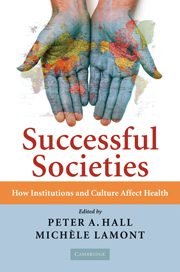Book contents
- Frontmatter
- Contents
- Contributors
- Preface
- Introduction
- 1 Population Health and the Dynamics of Collective Development
- 2 Social Interactions in Human Development: Pathways to Health and Capabilities
- 3 Health, Social Relations, and Public Policy
- 4 Population Health and Development: An Institutional-Cultural Approach to Capability Expansion
- 5 Responding to AIDS in Sub-Saharan Africa: Culture, Institutions, and Health
- 6 Responses to Racism, Health, and Social Inclusion as a Dimension of Successful Societies
- 7 Collective Imaginaries and Population Health: How Health Data Can Highlight Cultural History
- 8 Making Sense of Contagion: Citizenship Regimes and Public Health in Victorian England
- 9 The Multicultural Welfare State?
- 10 From State-Centrism to Neoliberalism: Macro-Historical Contexts of Population Health since World War II
- Bibliography
- Index
1 - Population Health and the Dynamics of Collective Development
Published online by Cambridge University Press: 05 June 2012
- Frontmatter
- Contents
- Contributors
- Preface
- Introduction
- 1 Population Health and the Dynamics of Collective Development
- 2 Social Interactions in Human Development: Pathways to Health and Capabilities
- 3 Health, Social Relations, and Public Policy
- 4 Population Health and Development: An Institutional-Cultural Approach to Capability Expansion
- 5 Responding to AIDS in Sub-Saharan Africa: Culture, Institutions, and Health
- 6 Responses to Racism, Health, and Social Inclusion as a Dimension of Successful Societies
- 7 Collective Imaginaries and Population Health: How Health Data Can Highlight Cultural History
- 8 Making Sense of Contagion: Citizenship Regimes and Public Health in Victorian England
- 9 The Multicultural Welfare State?
- 10 From State-Centrism to Neoliberalism: Macro-Historical Contexts of Population Health since World War II
- Bibliography
- Index
Summary
INTRODUCTION
The level of health of people living in a society is an indicator of success of that society. Population health is determined by the circumstances and contexts of life, from the most intimate to the broadest socioeconomic element. These conditions, in turn, are strongly influenced by institutions and policies of a society. In this chapter, we argue that there are four main implications for the relationship between society and health. The first implication is that material and psychosocial conditions express themselves in the form of health inequalities or “gradients.” The second is that public provision is critical to population health because it has the capacity to reduce the level of socioeconomic inequality generated by market forces and to buffer its effects. The third is that, since socioeconomic, institutional, and policy shifts often unfold over decades, population health must attend to these big, slow-moving processes. The fourth implication is that, in turn, a longitudinal perspective on population health trends can reveal large, slow-moving processes that might otherwise remain undetected.
From cross-sectional and life course studies, the mechanisms connecting society and health can be framed at three levels of societal aggregation. At the macro level are such society-wide influences as levels and fluctuations of national income, and particularly patterns of distribution, and policies intended to affect these (for example, income support, education, health care or employment policies). At an intermediate, or meso level, are the characteristics of one's immediate community or workplace.
Information
- Type
- Chapter
- Information
- Successful SocietiesHow Institutions and Culture Affect Health, pp. 23 - 52Publisher: Cambridge University PressPrint publication year: 2009
Accessibility standard: Unknown
Why this information is here
This section outlines the accessibility features of this content - including support for screen readers, full keyboard navigation and high-contrast display options. This may not be relevant for you.Accessibility Information
- 12
- Cited by
